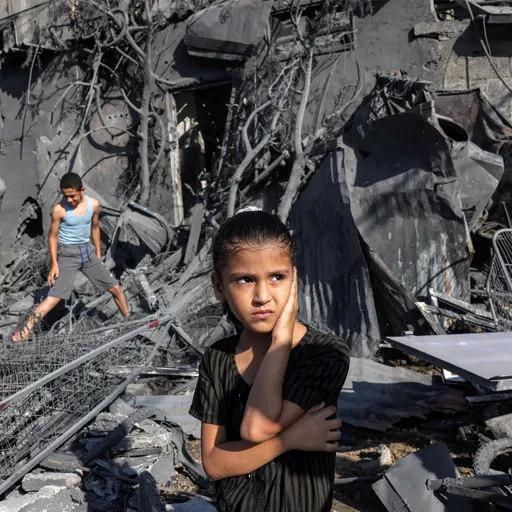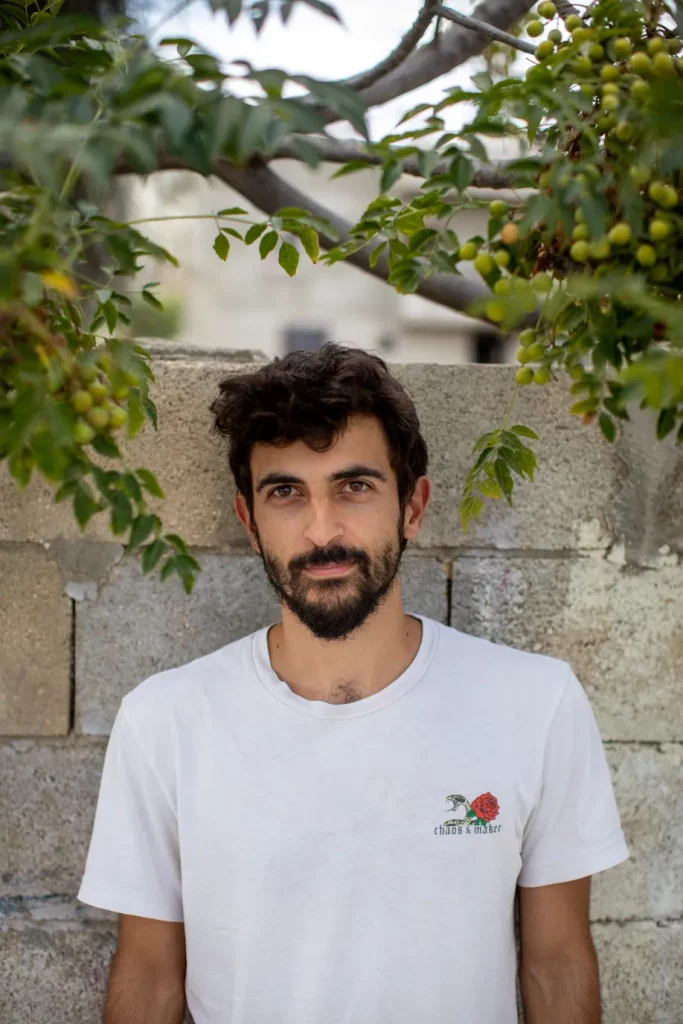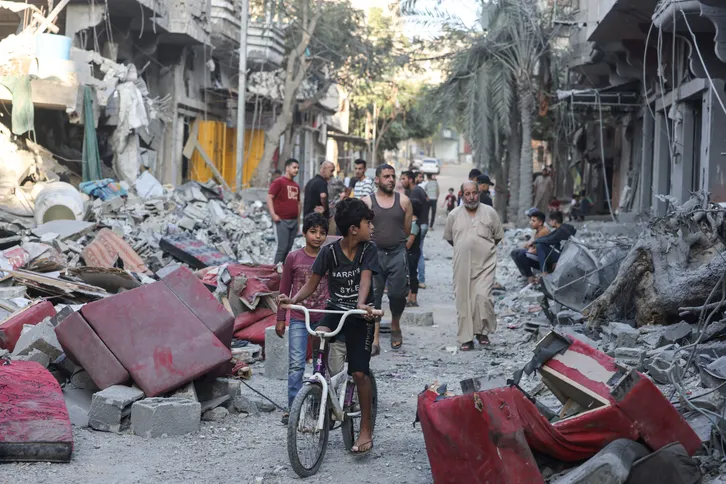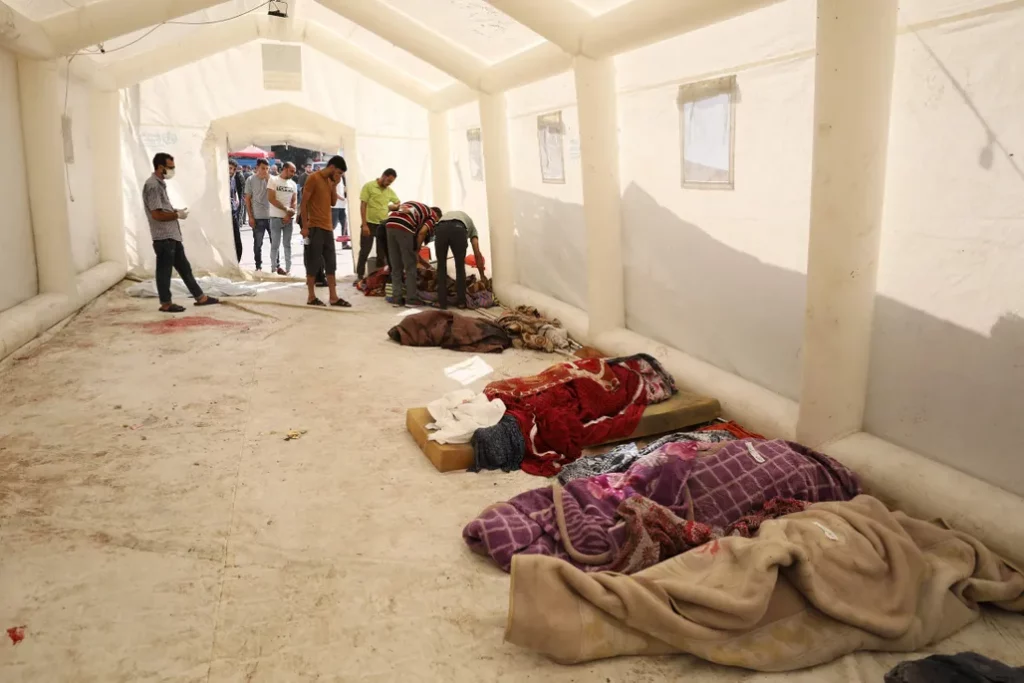On the Facebook page ‘Across the Wall,’ Israelis read personal stories by Gazans in Hebrew, until the last update came in: ‘The entire family of this page’s founder has been bombed to death.’ The Israeli co-founder of the page now says: ‘I don’t know if we’ll be able to build that bridge again’

For four years, a Facebook page has been bringing Israelis personal stories and glimpses into daily life that is completely foreign to them: that of average Gazans. The page, called “Across the Wall,” features the accounts of children fleeing bombardment, local initiatives to clean up Gaza’s beaches, and direct addresses from civilians living in the Strip to Israelis.
“Across the Wall” is run by the Israeli journalist Yuval Abraham, who co-founded it with Gazan journalist Ahmed Alnaouq. They are both 29.
“It’s more important now than ever. We need to start to understand how we can build more equal relations between Israelis and Palestinians,” says Abraham. “A big part of that is to listen to Palestinians from Gaza and what they experience – to think about how we would feel if we were in their shoes.”
“Across the Wall” started in 2019. “I was writing an article on how Palestinians in Gaza feel about the elections going on in Israel,” he says. Israeli elections have a significant impact on Gaza, he explains: their currency is the Israeli shekel, Israel decides what may be imported into Gaza and what may be exported. Israel controls the borders and the airspace. “I sent a message to a Gazan journalist named Ahmed Alnaouq, who I’d followed on Facebook – I hadn’t met him before that. I told him about myself, and he agreed to be interviewed,” he says.
That interview lasted about an hour. “At the end, he told me that he’d never spoken to an Israeli before, and that he has a lot of questions for me. He started interviewing me,” he says with a laugh. Over the course of the discussion, they realized that their politics mostly align.

Ahmed had put together a group of young journalists in Gaza writing about their lives for a project called “We Are Not Numbers.” “He said he dreamed of translating these into Hebrew, so they would reach an Israeli audience as well,” Abraham says. Again Abraham tapped Facebook, seeking translators who could translate the English-language accounts into Hebrew. Within an hour, he says, 150 people volunteered.
The project began with about 200 Israelis helping to bring the voices of Gazans to their countrymen. In time, the project entered its next phase: Writers in Gaza, translators into Arabic in Israel (including Palestinian Israelis and Israeli Jews) transitioned from translating the accounts in “We Are Not Numbers” to compiling their own stories, published in Hebrew.
“I grew up in southern Israel. When I was growing up, we didn’t hear anything about Gaza – even as an adult, in leftist circles,” Abraham says. “During ‘peacetime,’ Israelis don’t hear anything about Gaza or know anything about Gaza. It’s very much a black hole, a threatening place that we just know is dangerous. One of the reasons that I felt it’s very important to know what’s going on in Gaza is that there is no ‘peacetime’ in Gaza… when you live under siege, even when there is no war, every day is a sort of war to survive. It was important to me that the Israeli public hear this, because this situation is unsustainable. This can’t be a permanent situation. We can’t think we can manage it if we just build a tall enough wall.”
How do Israelis respond to “Across the Wall”? During peacetime, traffic is low. But during Israel’s wars and operations in Gaza, the page reaches a massive audience. Abraham notes that over a million people read their posts during the fighting between Israel and Gaza in 2021.

We can put up a post where a whole family is bombed and everyone died, and the most common response is ‘it’s Hamas’ fault because you voted for them, because Hamas uses human shields,’ etc. We tried to counter that in different ways
Yuval Abraham
“The responses can be divided into two categories,” he says. “Most of the comments are harsh. The one that’s repeated the most, in many different versions, is that it’s Hamas’ fault, not Israel’s. We can put up a post where a whole family is bombed and everyone died, and the most common response is ‘okay, it’s Hamas’ fault because you voted for them, because Hamas uses human shields, etc. We tried to counter that in different ways – about 50 percent of the Gazan population is children; they didn’t participate in the elections; the siege has political goals, not just security ones – to prevent a Palestinian state in Gaza and the West Bank. But those responses keep coming up.”
One post from August tackles the question directly. Ismail, one of the project’s Gazan journalists, writes: “In every post I write for you from my computer in Gaza, one comment keeps coming up: Why don’t I blame Hamas? Because it would be a convenient justification for Israelis to find more creative ways to destroy us. Where is the logic in me, as a Palestinian, convincing myself that Hamas is worse than Israel, when the source of all the destruction and killing I’ve seen in my life was Israel?”
He adds: “When I refuse to say a word about Hamas, it’s because I refuse to be dehumanized and to be considered collateral damage, like all the others who didn’t deserve to be killed but were killed.”
Responses to the post vary. Some wish the writer peace and security. Others wish him ill. But all have read his message.
“Thought-provoking and difficult to read. Thank you for writing it,” reads one Israeli’s comment. Another reads “Will you publish every lie about Gaza and Israel? There’s history and facts, aren’t you ashamed?”

After Oct. 7, now that everyone’s empathy is going first and foremost to their own countrymen, how could Israelis listen to what’s happening in Gaza? I talked to Ahmed about this, and he said that it’s important to write, even though it’s so hard.
Yuval Abraham
Certain messages, “which perhaps give a bit more hope, are those of people who were affected by what they saw, who said that it changed something in their worldview,” Abraham says. “There are many Israelis who, during wartime, are a bit afraid to express political opinions that contextualize things, or criticize Israel as well as Hamas.”
For some Israelis, sharing posts creates an opportunity to provide a platform for a critical message without having to say it themselves, he adds. “They have these human voices from Gaza that allow them to express it.”
The last update
The events of October 7 shook the team to their core, Abraham says. “When the horrifying, unjustified Hamas attacks occurred, and so many Israelis were massacred, in the beginning we were in shock. All of us. Ahmed and I spoke a couple days after it happened. It was a very, very sad conversation. I think that both of us felt like this could occur, that a horrifying bombshell like this was just a matter of time.
“On our page, we always tried to take things to the root of the matter, to talk about political matters, about how there’s inequality, about how Israelis have freedom of movement and Palestinians don’t, and we were always thinking of ways to change this. And suddenly it was like, ‘Shit, everything’s been ruined, what value does anything we’re writing have? Who cares about it?’
“I even said that writing about Gaza for Israelis – before, it was hard for people to process. Now that everyone’s empathy is going first and foremost to their own countrymen who were murdered, how could they listen to what’s happening in Gaza? It was uncomfortable, because I really care about what’s going on in Gaza – we’re bombing in a way that makes it certain that civilians will be killed. We’re wiping families from the Earth. I talked to Ahmed about this, and he said that it’s important to write, even though it’s so hard.”
The site isn’t updated regularly, but had been posting new things about once a day in August, for instance. Since October 7, the page has published only two stories: one is about Abrar, a 14-year-old girl whose family has sought refuge at an UNRWA school. The other is from Ismail, about his hopelessness, fear and pain – and yes, acknowledging the massacre of Israelis.
But those two posts were the only ones to go up before Saturday brought a chilling update.
“The entire family of this page’s founder in Gaza, who has written countless messages to Israelis for peace and a just future over the years, has been bombed to death this week by the air force,” it read. “They were 23 people. All of his loved ones: His father, his little sisters, his brother, his nieces and nephews, even the babies that were in the house – they are all dead.” After a description of the state of some of the family members’ bodies after the bombing, the message concludes: “Sadly, for this reason, posts to this page will stop for the time being.”

The last post on Across the Wall included this update on Ahmed’s family: “They were 23 people. All of his loved ones: His father, his little sisters, his brother, his nieces and nephews, even the babies that were in the house – they are all dead.”
Alnaouq, who is now based in the United Kingdom, was not there during the strike that killed this family. Abraham says that he wrote a long letter to him, expressing his sorrow and regret. They have corresponded a bit via WhatsApp since, but the project is on hold. “I try to think to myself, if a Palestinian killed my entire family, killed all the kids in my family, how would I respond? How would I think? I can’t think about it,” Abraham says.
Will the project go on? “I don’t know,” he says, and takes a long pause. “Somehow, I hope it does continue, but I really don’t know. I don’t know what it’ll be like the day after this war, if we’ll be able to build that bridge, if there’s even a chance in the world after so many people have been killed, when the threshold of hate has never been higher.”
He had to close the comments on the post announcing Alnaouq’s family’s deaths – something the page has never done, and something he said Alnaouq himself had never condoned.
“Ahmed said in the past that sure, people are opposed to [this content], but that’s how you make change, that’s how you impact them – he’s a very optimistic man. I couldn’t imagine a person who just lost their whole family sitting down and reading comments like ‘why didn’t they evacuate? Why didn’t they go somewhere else? They deserve it, this is all Hamas.’ You can’t say these things when you look at someone in Gaza and see a human being.”
The dehumanization, he says, reaches far beyond the Facebook page and its responses. “The only way for us to bomb, the way we’re bombing now, is out of complete lack of empathy for the people living there. In a world in which their lives have meaning, we would think of different ways and different means to provide security for Israelis.”
He adds: “I believe that all this pain that Gaza has now will be translated into pain directed at us. Our fates are intertwined, between Israel and Palestinians. What happens there will be internalized here; what happens here will be internalized there.
“The thought that we’ll have security even if we manage to defeat Hamas through the killing of some 3,000 children – it isn’t true. It’ll create Hamas 2. It’ll create tens of thousands of people in Gaza with hearts full of hatred and anger and rage, and it will ruin us too. People say that if you say these things, you’re supporting Hamas or justifying Hamas – on the contrary,” Abraham says. “We, as Israelis, cannot have security if Palestinians don’t have freedom.”
